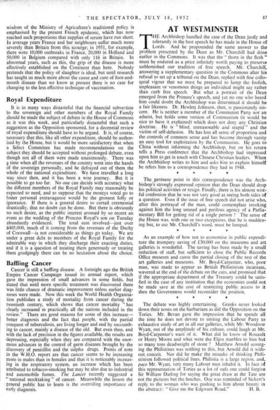AT WESTMINSTER T HE Archbishop handled the case of the Dean
justly and tolerantly in the best speech he has made in the House of Lords. And he propounded the same answer to the problem presented by the Dean as Mr. Churchill had done earlier in the Commons. It was that the "thorn in the flesh" must be endured as a price infinitely worth paying to preserve unblemished our tradition of free speech. Mr. Churchill. answering a supplementary question in the Commons after his refusal to set up a tribunal on the Dean, replied with fine collo- quial vigour that we must be prepared to lump the foolish. unpleasant or venomous things an individual might say rather than curb free speech. But what a portrait of the Dean emerged from the Primate's speech, and yet no one who heard him could doubt the Archbishop was aetermined it should be a fair likeness. Dr. Hewlett Johnson, then, is passionately sin- cere. He is neither a member of the Communist Party nor an atheist, but holds some version of Communism (it would be nice to have it explained) which does not deny any Christian doctrine. He is "blind, unreasonable and stupid" and the victim of self-delusion. He has lost all sense of proportion and the controls of common sense and has become through vanity an easy tool for exploitation by the Communists. He goes to China without informing the Archbishop, but on his return tells a Press conference that the Archbishop had impressed upon him to get in touch with Chinese Christian leaders. When the Archbishop writes to him and asks him to explain himself he refers him to a correspondence they had in 1948.
* * * * The germane point in this correspondence was the Arch- bishop's strongly expressed opinion that the Dean should drop his political activities or resign. Finally, there is his almost wist- ful confession that he was not very good at seeing both sides of a question. Even if the issue of free speech did not arise who, after this portrayal of the man, could contemplate invoking against him the long unused and perilous agency of a Parlia- mentary Bill for getting rid of a single person ? The sense of the House was, with one or two exceptions, that he is madden- ing but, to use Mr. Churchill's word, must be lumped.
As an example of how not to economise in public expendi- ture the trumpery saving of 00,000 on the museums and art galleries is wonderful. The saving has been made by a small reduction of staff, but sufficient to close the Public Records Office museum and cause the partial closing of the rest of the art galleries and museums. Mr. Boyd-Carpenter, who, poor man, was made to appear as British Philistinism incarnate, wavered at the end of the debate on the cuts, and promised that if the appropriate department of the Treasury could be satis- fied in the case of any institution that the economies could not be made save at the cost of restricting public access to it then the Government would reconsider the position.
The debate was highly entertaining. Greeks never looked down their noses on the barbarians as did the Opposition on the Tories. Mr. Bevan gave the impression that he spends all the time he does not devote to uniting the Labour Party to exhaustive study of art in all our galleries, while Mr. Woodrow Wyatt, out of the amplitude of his culture, could laugh at Mr. Boyd-Carpenter's want of it. What did he know of Rouault or Henry Moore and what were the Elgin marbles to him but so many tons deadweight of stone ? Matthew Arnold scourg- ing the Philistines was nothing to this, but Arnold did it with- out conceit. Nor did he make the mistake of thinking Phili- stinism followed political lines. Philistia is a large region, and. pace Mr. Wyatt, very many Labour men inhabit it. In face of this representation of Tories as a lot of oafs one could forgive Sir William Darling for saying the great draw at the Tate are not the pictures but the lunches. One was reminded of Sickert's reply to the woman who was gushing to him about beauty in the abstract: "Give me the Edgware Road." H. B.


































 Previous page
Previous page